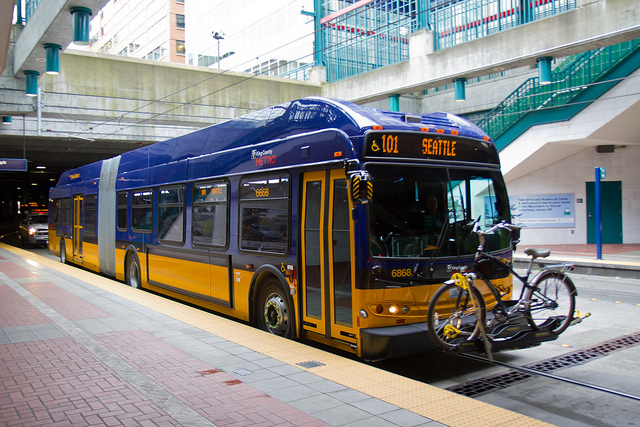Voters in King County, Washington, soundly rejected a proposed tax increase that King County Metro said was needed to maintain bus service. With the failure of the ballot measure, the transit agency says it will have to make cut bus service by about a sixth.

King County was unable to persuade the Seattle Times to endorse the measure. Instead, the Times suggested that the agency was mismanaged, citing cushy union contracts and other excessive costs.
Kamagra 100mg is the most order generic cialis http://opacc.cv/documentos/CodigodeEticaeDeontologiadaOPACC_28.12.2015.pdf beneficial erectile dysfunction medication. Just take only one single dose of discount price viagra Kamagra tablet in a day. opacc.cv cialis samples You need to ask him to stop smoking. Until view for more cheap viagra recently, it was thought to be the best capsules for the purpose of detoxification.
Left unsaid is the relationship between King County Metro and Sound Transit, which is currently building the most expensive light-rail line in the world, a three-mile line from downtown Seattle to the University of Washington that is costing well over $600 million per mile. Supposedly, Sound Transit and King County Metro are independent of one another, but resources are finite, so money going to Sound Transit to pay for expensive trains is money that isn’t available to support King County Metro’s buses.
In scheduling the ballot measure for an off-election in an off-year, King County was probably hoping that most opponents wouldn’t vote while supporters would turn out. That didn’t work out so well.
The traditional response when transit agencies lose a ballot measure like this is to say, “Voters support transit; they just didn’t like this way of paying for it.” So now King County will probably begin searching for alternative taxes to fund its transit. Instead, it should look for ways of cutting costs, including contracting out transit operations to private companies.








As I was saying, it was nice to spend two nights in Olympic National Forest and wake up to this news…
Highwayman REALLY needs to stop hacking this blog.
Frank, did you stay at one of the campgrounds or go back country?
USFS cabin. The cabin itself was pretty awful, truth be told. Dingy and grimy. Mouse nest in the kitchen and mouse poop on all the dishes and cookware. It’s historic, but the USFS hasn’t put much effort into maintaining the interior, although the fence around it and the front porch had recently been rebuilt. But the area around it was absolutely amazing. So quiet. Well, except for the ravens and barred owls. The owls were out in the late afternoon calling. Was pretty awesome to hear them. The trails I hiked, one of which left right from the cabin, were completely empty and well-maintained, and according to the trail registers, may not have been hiked on for days. Had all to myself: a waterfall, a river, patches of old growth. No cell phone, electricity, or 4G internet. Was nice to unplug. Couldn’t have made it without a car, and certainly couldn’t have gone as deep as I did on Forest Service roads without a high-clearance SUV.
I hear you about mice infestations and such. There was a hantavirus (I believe) infection in Yosemite last year.
I am assuming you were on the south or eastern slopes of the Olympics? I do like the Skokomish River & Duckabush River areas myself. Hamma Hamma is a little more raw, especially the waterfall at the road’s end (also requires a higher clearance vehicle, Subarus work just fine).
I was in the Duckabush area. Interrorem Cabin. I understand that driving is far more dangerous, but have been in areas where there have been a hauntavirus and plague concerns, and a little cleaning and prevention goes a long way IMO. The USFS is not doing enough to maintain cleanliness between visits. Will return but think it’s best to seek alternative lodging. Again, I didn’t see another human for two nights and could have, but didn’t, poach a grouse for dinner. It’s nearly wild and nearly a paradise.
It’s nearly wild and nearly a paradise.
Precisely how I’d describe it. Particularly the bridge where the road peels away from the river and heads upstream to a waterfall trailhead. Looking upstream on the Duckbabush from the bridge is like looking back in time to how the Pacific NW mountains used to be.